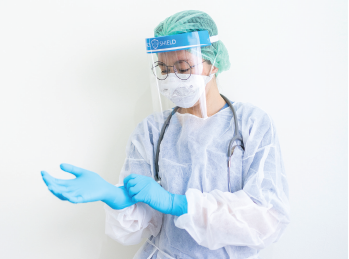Duty to Patients and Society
Is there a difference between “answering the call of duty” and “above and beyond the call of duty?” Do we actually “swear an oath” to place ourselves as physicians at higher-than-usual risk? When is it too much for us to handle? These questions and many more are on our minds today as we as a profession, specialty, and American citizens respond to COVID-19.
Explore This Issue
May 2020Swearing to the Hippocratic Oath isn’t widely practiced today, although many medical schools subscribe to some type of professional oath for students under which they agree to uphold certain ethical rules and expectations as a physician. These oaths are much like the ethics codes of our profession—in particular the AMA Code of Ethics, which prescribes certain duties, behaviors, guidelines, societal expectations, and conduct.
The AMA Code of Medical Ethics Opinion 9.067 addresses guidelines for an individual physician’s duty to “provide urgent medical care during disasters,” including epidemics, and notes that “this ethical obligation holds even in the face of greater than usual risks to their own safety, health, or life.” (Virtual Mentor. 2010;12:717-718) However, the Opinion also advises physicians to balance their duty to individual patients with their ability to care for patients in the future. This leaves the decision up to ethical judgment.
Many otolaryngologists will have the opportunity to participate in the early development of protocols to protect patients and healthcare workers in departments and institutions. Safety measures should consider vulnerable persons, pertinent patient (and healthcare worker) screening, and rapid disposition of suspected exposures for testing, isolation, or home quarantine. We have an ethical duty to raise concerns if safety measures are incorrect, incomplete, or risky.

© theskaman306 / shutterstock.com
We also have an important obligation to educate our patients for their own protection, and to reassure them with respect to their fears and concerns. AMA Code of Ethics Opinion 2.25 sets forth an expectation that physicians will support isolation and quarantine public health protocols and educate patients on their importance (Virtual Mentor. 2010;12:717-718). Additionally, calling to check on patients with chronic or subacute conditions, returning calls, updating them on laboratory and radiographic results, refilling prescriptions, and speaking calmly can help alleviate some of their isolation and disconnection. During these critical periods, however, patient health information confidentiality must still be protected, and consent obtained for telemedicine consultations. (Eur Respir J. 2009;34:303-309;DOI:10.1183/09031936.00041609; BMC Med Ethics. 2006;7:E5).
One of the harshest ethical dilemmas during epidemics is whether it will, at some point, be necessary to consider imposing limits on the continued care of critically ill patients who aren’t expected to survive. Many COVID-19 patients are critically ill for weeks, requiring intensive care and ventilator support. If there aren’t enough critical care facilities, medical equipment, and healthcare personnel resources available, discussions among bioethicists have turned to considering a triage care system based on chance for survival versus futility of care. Care triage has been a mainstay of combat casualty care for at least a century. Whether U.S. care limitations will be suggested during the COVID-19 pandemic is currently unknown, but it’s possible if critical patient demand is significantly greater than medical resources. Ethically, this falls under the guidance of the principle of the greatest good for the greatest number, but it will be a moral and an ethical challenge for physicians who have to make decisions to withhold/withdraw care.